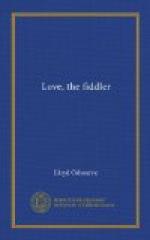She had not a spark of pity for her husband. To owe what you could not pay was to her the height of dishonour. It was theft, and she had no compunction in giving it the name, however it might be disguised or palliated. She could see no mitigating circumstances in Raymond’s disgrace, and the fact that she was innocently involved in his downfall filled her with exasperation. The big old corner house was her own. She had been born in it. It had been her marriage portion from her father. She put it straightway under the hammer; her canal stock with it; her furniture and linen; a row of five little cottages on the outskirts of the town where five poor families had found not only that their bodies, but the welfare of their souls, had been confided to her grim keeping. She stripped herself of everything, and when all had been made over to the creditors there still remained a deficit of seventeen hundred dollars. This debt which was not a debt, for she was under no legal compulsion to pay a penny of it, would willingly have been condoned by men already grateful for her generosity; but she would hear of no such compromise, not even that her notes be free of interest, and she gave them at five per cent, resolute that in time she would redeem them to the uttermost farthing.
Under these sudden changes of fortune it is seldom that the sufferer remains amid the ruins of past prosperity. The human instinct is to fly and hide. The wound heals more readily amongst strangers. The material evils of life are never so intolerable as the public loss of caste. It may be said that it is people, not things, which cause most of the world’s unhappiness. Mrs. Raymond came to New York, where she had not a friend except the son she brought with her, there to set herself with an undaunted heart to earn the seventeen hundred dollars she had voluntarily taken on her shoulders to repay.
George Raymond, her son, was then a boy of fifteen. High-strung, high-spirited, with all the seriousness of a youngster who had prematurely learned to think for himself, he had arrived at the age when ineffaceable impressions are made and the tendencies of a lifetime decided. Passionately attached to his father, he had lost him in a way that would have made death seem preferable. He saw his mother, so shortly before the great lady of a little town, working out like a servant in other people’s houses. The tragedy of it all ate into his soul and overcame him with a sense of hopelessness and despair. It would not have been so hard could he have helped, even in a small way, towards the recovery of their fortunes; but his mother, faithful even in direst poverty to her New England blood, sent him to school, determined that at any sacrifice he should finish his education. But by degrees Mrs. Raymond drifted into another class of work. She became a nurse, and, in a situation where her conscientiousness was invaluable, slowly established a connection that in time kept her constantly busy. She won the regard of an important physician, and not only won it but kept it, and thus little by little found her way into good houses, where she was highly paid and treated with consideration.




